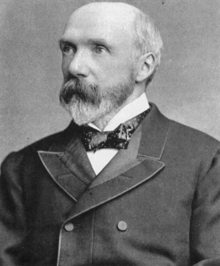
John Anderson (zoologist)
Encyclopedia

Scotland
Scotland is a country that is part of the United Kingdom. Occupying the northern third of the island of Great Britain, it shares a border with England to the south and is bounded by the North Sea to the east, the Atlantic Ocean to the north and west, and the North Channel and Irish Sea to the...
anatomist and zoologist
Zoology
Zoology |zoölogy]]), is the branch of biology that relates to the animal kingdom, including the structure, embryology, evolution, classification, habits, and distribution of all animals, both living and extinct...
who worked in India.
He was born in Edinburgh
Edinburgh
Edinburgh is the capital city of Scotland, the second largest city in Scotland, and the eighth most populous in the United Kingdom. The City of Edinburgh Council governs one of Scotland's 32 local government council areas. The council area includes urban Edinburgh and a rural area...
and graduated in medicine from the University of Edinburgh
University of Edinburgh
The University of Edinburgh, founded in 1583, is a public research university located in Edinburgh, the capital of Scotland, and a UNESCO World Heritage Site. The university is deeply embedded in the fabric of the city, with many of the buildings in the historic Old Town belonging to the university...
in 1861. His thesis however was in zoology. He initially studied marine organisms based on dredging off the coast of Scotland and published notes in the Annals and Magazine of Natural History. He spent two years teaching at the Free Church College in Edinburgh and then left for India
India
India , officially the Republic of India , is a country in South Asia. It is the seventh-largest country by geographical area, the second-most populous country with over 1.2 billion people, and the most populous democracy in the world...
in 1864. During his time in Calcutta, he supported the creation of the zoological garden there. He become the first curator
Curator
A curator is a manager or overseer. Traditionally, a curator or keeper of a cultural heritage institution is a content specialist responsible for an institution's collections and involved with the interpretation of heritage material...
of the Indian Museum
Indian Museum
The Indian Museum is the largest museum in India and has rare collections of antiques, armour and ornaments, fossils, skeletons, mummies, and Mughal paintings...
at Calcutta in 1865 and held the position until 1887, when he was succeeded by James Wood-Mason
James Wood-Mason
James Wood-Mason was a Scottish zoologist who worked in the Indian Museum at Calcutta from 1877 succeeding Prof. John Anderson. He made many collections of marine animals and lepidoptera.-Publications:...
. During his time in India, he made several collecting expeditions to China
China
Chinese civilization may refer to:* China for more general discussion of the country.* Chinese culture* Greater China, the transnational community of ethnic Chinese.* History of China* Sinosphere, the area historically affected by Chinese culture...
and Burma. In 1867 he accompanied Colonel Edward Bosc Sladen as a naturalist on an expedition to Upper Burma and Yunnan. In 1875-6 he travelled to the same area under Colonel Horace Browne. Anderson made a third expedition for the Indian Museum in 1881–2 to the Mergui archipelago, Burma.
After his return to Britain he made extensive zoological collections in Egypt
Egypt
Egypt , officially the Arab Republic of Egypt, Arabic: , is a country mainly in North Africa, with the Sinai Peninsula forming a land bridge in Southwest Asia. Egypt is thus a transcontinental country, and a major power in Africa, the Mediterranean Basin, the Middle East and the Muslim world...
, forming the basis of his Zoology of Egypt. He died in Buxton
Buxton
Buxton is a spa town in Derbyshire, England. It has the highest elevation of any market town in England. Located close to the county boundary with Cheshire to the west and Staffordshire to the south, Buxton is described as "the gateway to the Peak District National Park"...
, England.
Species named after him include Sacculina
Sacculina
Sacculina is a genus of barnacles that is a parasitic castrator of crabs. The adults bear no resemblance to the barnacles that cover ships and piers; they are recognised as barnacles because their larval forms are like other members of the barnacle class Cirripedia...
andersoni Giard, 1887, a parasitic barnacle
Barnacle
A barnacle is a type of arthropod belonging to infraclass Cirripedia in the subphylum Crustacea, and is hence related to crabs and lobsters. Barnacles are exclusively marine, and tend to live in shallow and tidal waters, typically in erosive settings. They are sessile suspension feeders, and have...
.

